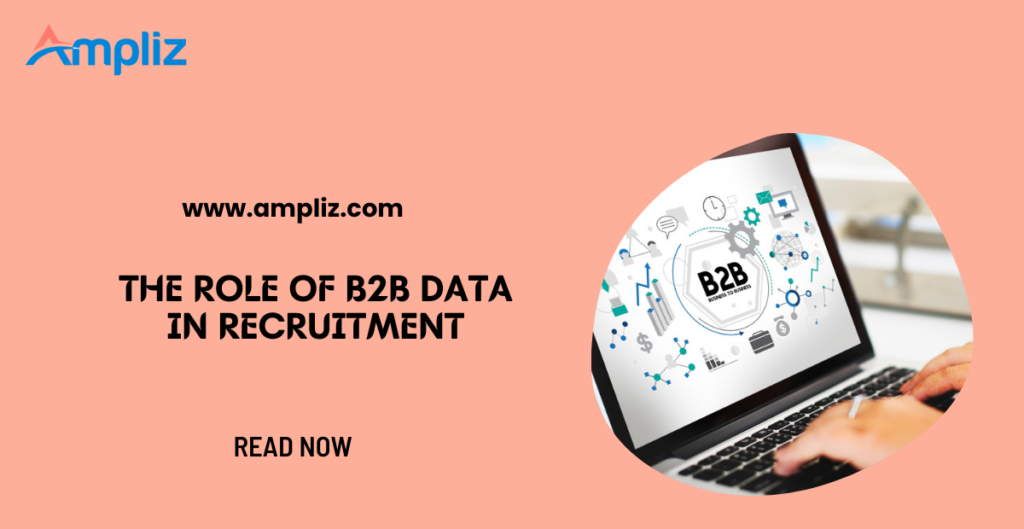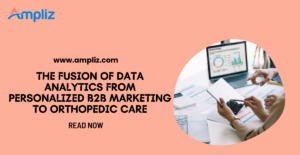Recruitment is moving faster right now than it has ever moved before. Staying ahead is not just about sourcing top talent; it’s about understanding and harnessing the power of data to drive growth.
Data-driven recruitment is not merely a trend but a transformative approach that can elevate your agency’s success. In this article, we explore the pivotal role of data in the recruitment industry, how it can revolutionize your strategies, and the tangible benefits it brings to the growth of your agency.
The Role of B2B Data in Recruitment
Data plays a central role in modern recruitment by providing valuable insights into talent acquisition, allowing you to make informed decisions that align with your agency’s growth objectives.
The sheer volume of data available enables you to go beyond traditional methods, leveraging big data to identify patterns, trends, and potential candidate matches. This shift towards a data-centric approach empowers you to personalize your recruitment strategies, ensuring that your outreach resonates with candidates on a more individual level.
Moreover, analytics becomes a powerful ally in your decision-making process.
By analyzing key performance indicators (KPIs), you gain a deeper understanding of your agency’s strengths and areas for improvement. This analytical approach allows you to optimize your recruitment processes continually, leading to increased efficiency, reduced time-to-fill, and enhanced overall effectiveness in talent acquisition.
Key Benefits of Using Data in Recruitment
Embracing data-driven recruitment brings a myriad of benefits that directly contribute to the growth and success of your agency.
One of the primary advantages is the ability to improve candidate matching and selection. With detailed candidate profiles and a nuanced understanding of their skills and experiences, you can significantly enhance the precision of your placements, resulting in higher client satisfaction and increased likelihood of successful hires.
Efficiency is another key area where data-driven recruitment shines.
Through automated processes and AI-driven technologies, you can streamline various stages of the hiring process, from resume screening to interview scheduling. This efficiency not only reduces the time it takes to fill positions but also allows your recruitment team to focus on high-value tasks, such as building relationships and understanding the unique needs of your clients and candidates.
Types of Data to Focus On
To fully leverage the potential of data-driven recruitment, it’s essential to understand and prioritize the types of data available. Candidate data, including resumes, profiles, and assessments, offers a comprehensive view of individuals’ qualifications and experiences.
By tapping into this information, you can tailor your approach to each candidate, ensuring a personalized and engaging recruitment experience.
Market data is equally crucial, providing insights into industry trends and competitor activities. Analyzing market data allows you to position your agency strategically, staying ahead of emerging trends and identifying niche opportunities.
Additionally, performance data, encompassing metrics such as time-to-fill and cost-per-hire, offers a quantifiable way to assess the effectiveness of your recruitment strategies and make data-driven adjustments for continuous improvement.
Implementing Data-Driven Technologies
The integration of data-driven technologies is a pivotal step in unlocking the full potential of data for your recruitment agency. Applicant Tracking Systems (ATS) streamline your recruitment processes, providing a centralized platform to manage candidate profiles, applications, and communications. This not only enhances organizational efficiency but also ensures a seamless and organized recruitment workflow.
Artificial Intelligence (AI) is a game-changer in data-driven recruitment, helping you better analyze vast datasets, identify patterns, and predict candidate success with a higher degree of accuracy.
From chatbots facilitating initial candidate interactions to algorithms assessing candidate suitability, AI adds a layer of sophistication to your recruitment strategies, enabling you to make data-informed decisions at every stage of the hiring process.
Predictive analytics tools further complement your data-driven approach by forecasting talent needs and trends. By analyzing historical data, these tools can identify patterns that help you anticipate future talent demands, enabling proactive talent acquisition strategies.
This forward-thinking approach positions your agency ahead of the curve, ensuring that you are well-prepared to meet the evolving needs of your clients.
Overcoming Challenges in Adopting Data-Driven Recruitment
While the benefits of data-driven recruitment are substantial, there are challenges to navigate on the path to implementation. Data privacy and compliance considerations are paramount, as handling sensitive candidate information requires a robust framework to ensure adherence to regulations.
Building a data-driven culture within your organization is equally vital; it involves not only investing in technology but also fostering a mindset that values and utilizes data at every level of decision-making.
You also need to be aware and on top of potential biases in data-driven recruitment.
Biases present in historical data can perpetuate inequality in hiring outcomes. It’s essential to implement strategies and algorithms that actively counteract biases, promoting diversity and inclusivity in your candidate selections.
By acknowledging and actively working to mitigate biases, you not only adhere to ethical standards but also create a more equitable and effective recruitment process.
Case Studies: Successful Applications of Data in Recruitment
Real-world case studies provide tangible evidence of the transformative power of data-driven recruitment strategies. For example, a recruitment agency leveraging data analytics to identify key skills in high-demand industries experienced a significant reduction in time-to-fill positions.
By understanding the market demand through data analysis, the agency optimized its candidate sourcing efforts, resulting in faster placements and increased client satisfaction.
Another case study showcases the impact of predictive analytics in forecasting talent needs. A forward-thinking recruitment agency analyzed historical data to identify seasonal trends in hiring. Armed with this information, they proactively sourced and engaged candidates in anticipation of increased demand during peak periods.
This proactive approach not only met client expectations but also positioned the agency as a strategic partner attuned to the dynamic nature of the job market.
Steps to Incorporate Data into Your Recruitment Agency
Incorporating data into your recruitment agency involves a systematic approach that encompasses assessment, training, and strategic planning.
Step 1: Begin by conducting a comprehensive data audit to assess your current data capabilities. Understand the sources of your data, its accuracy, and the technologies supporting its management. This audit serves as a baseline, helping you identify areas for improvement and set realistic goals for implementing data-driven recruitment strategies.
Next comes training and upskilling your recruitment teams in data literacy.
Equip your teams with the skills to interpret and leverage data effectively. Offer training programs that cover data analysis tools, statistical concepts, and the interpretation of key recruitment metrics. By fostering a culture of data literacy, you empower your teams to make informed decisions based on data, fostering a more efficient and proactive recruitment environment.
Following that, establish key performance indicators (KPIs) for data-driven success.
This is how you align your recruitment agency’s goals with measurable outcomes. Make sure you are defining KPIs that reflect your agency’s specific objectives, such as reducing time-to-fill, improving candidate quality, or enhancing client satisfaction. Regularly monitor and analyze these KPIs to gauge the effectiveness of your data-driven strategies, allowing you to make informed adjustments and optimizations.
Future Trends in Data-Driven Recruitment
As technology continues to advance, the future of data-driven recruitment holds exciting possibilities. Evolving technologies are poised to shape the recruitment landscape, with advancements in predictive analytics, artificial intelligence, and machine learning playing pivotal roles.
On top of that, predictive analytics is expected to become more sophisticated, offering deeper insights into talent trends and allowing recruitment agencies to stay ahead of emerging skill requirements.
Artificial intelligence will continue to evolve, influencing decision-making processes and enhancing candidate experiences. AI-driven tools will become more adept at automating routine tasks, enabling recruitment teams to focus on strategic activities that require a human touch and machine learning algorithms will refine their predictive capabilities, providing more accurate assessments of candidate suitability and potential for success in specific roles.
The role of data in addressing emerging recruitment challenges is also a key trend to watch. From adapting to remote work dynamics to navigating shifting workforce demographics, data-driven insights will be invaluable in developing agile and effective recruitment strategies.
Conclusion
In conclusion, the journey to grow your recruitment agency is intricately tied to your ability to harness the power of data.
By adopting a data-driven approach, you gain a strategic advantage in talent acquisition, optimize your recruitment processes, and position your agency as a forward-thinking industry leader. From implementing cutting-edge technologies to overcoming challenges and learning from real-world case studies, integrating data into your recruitment strategies is not just a choice; it’s a necessity in the evolving landscape of modern recruitment.
Embrace the transformative potential of data, and propel your agency into a future where growth is not just a goal but a tangible outcome of your data-driven strategies.



